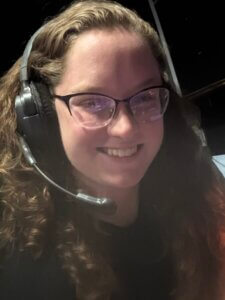
Mindleader Message in Tiara’s Hat Parade
What Tiara’s Hat Parade Teaches Us About Emotional Resilience...
Learn MoreOrlando Family Stage
The Finest in Family Theater
Behind every successful production at Orlando Family Stage is a stage manager orchestrating the unseen magic. They’re the ones calmly navigating chaos, catching the smallest details, and supporting artists with empathy and precision. In honor of International Stage Managers Day, we asked five of our phenomenal stage managers from the past several years to reflect on their journeys, share their wisdom, and offer guidance to young people curious about the backstage world.
Whether you’re a high school student exploring tech theatre or a drama teacher helping students find their path, this is a celebration of the artistry, leadership, and humanity that defines stage management.
A Profession of Accidental Discoveries and Unshakable Passion
Interestingly, several of our stage managers never set out to become one. For both Morgan Citrinite and Shannon Motherwell, it all started with a twist of fate.
“I accidentally became a stage manager,” Shannon laughs. “I took a couple of classes in undergrad and managed a few student productions, but it wasn’t until I took a chance and applied at Orlando Family Stage that I truly stepped into the role.”
Morgan had an even more dramatic start. “In middle school, my community theatre needed a student to call the show for a competition, less than 48 hours before we performed. I got a crash course, jumped on headset, and did it. After the show, the tech crew came up to me and said, ‘You were so professional!’ That was it. I knew this was what I wanted to do.”
For Stephanie Elliott, the pivot came during a rehearsal at the University of Florida when she filled in for an injured stage manager and instantly fell in love. “Leading tech week made me realize I enjoyed stage management more than performing.”
Michelle Shea and Olivia Perez found their path through mentorship. Michelle credits “teachers who encouraged me, challenged me, and showed me what it means to lead with empathy.” Olivia says, “My theatre teacher saw the stage manager in me before I did. That changed everything.”

What Makes a Great Stage Manager?
Across the board, every one of these stage managers emphasized that communication is the lifeblood of the job. But it goes far beyond talking. It’s about listening, translating, and being a hub of connection.
“As a stage manager, you’re at the center of the web,” Stephanie explains. “You receive information from every department and make sure the right people hear what they need, when they need it.”
Morgan adds, “I always ask myself the ‘W questions’—who, what, when, where, and why. If I were receiving this email or note, what would I need to know to succeed?”
That level of clarity requires more than communication, it also demands organization, emotional regulation, and big-picture thinking.
Olivia stresses, “You’ve got to keep a level head. When things are flying at you from all directions, stay calm. Even if that means stepping away for ten deep breaths.”
Michelle agrees: “You can’t pour from an empty cup. Take care of your body and mind first. Coffee helps! But so does preparing your paperwork early, setting priorities, and delegating with confidence.”

Tech Week, Teamwork, and Taking the Lead
For many stage managers, tech week is the most thrilling, and challenging, part of the job. It’s when all the elements come together: lights, sound, set, costumes, and actors. It’s also when tempers can flare and timing is everything.
“I love tech week,” Morgan says. “It’s exhausting, but it’s where you see the show come to life. Everyone is working toward the same goal.”
Olivia recalls managing a high-stress tech moment when scenic transitions were proving tricky. “The director was getting frustrated. I started walking through every cue step-by-step in advance so they felt more confident in the process. That simple shift made a huge difference.”
Sometimes, the unexpected forces quick decisions. Michelle tells the story of a last-minute cast change: “We had 15 minutes to rethink a major role and only 20 minutes to rehearse it. Everyone stepped up, our dance captain, an actor taking on new lines, and we made it work. That kind of collaboration is magic.”
Stephanie echoes that sentiment, sharing a moment during Orlando Family Stage’s How I Became a Pirate when the ship’s mast got stuck in a curtain. “I had to jump up, untangle it mid-entrance, and patch the curtain with safety pins, all while the scene was happening. You learn to solve problems quickly and keep the show moving.”

Leading With Heart
The job of a stage manager is deeply human. These professionals aren’t just organizing props and calling cues, they’re cultivating spaces of trust and respect.
“You have to know your team,” Stephanie says. “What do they love about theatre? What do they need to succeed? Stage management is about people as much as process.”
Morgan adds, “There’s a stereotype, especially in high school, that stage managers are bossy or mean. But really, we’re there to help. We’re facilitators, not dictators.”
That balance of leadership and collaboration is key. “We’re the logic brain in the room,” Michelle explains. “We guide the team toward a common goal, but we also build community along the way.”

Getting Started and Staying Inspired
So, how can students explore stage management? The advice is simple. Start small. Be curious. Ask questions.
“Volunteer at your school theatre or local community theatre,” Stephanie suggests. “Ask the stage manager if you can observe. That’s how I got started.”
Shannon agrees. “Shadow someone. My booth is always open to students who want to learn.”
There are also online resources. “Facebook groups like Year of the Stage Manager are incredible,” Olivia shares. “You’ll find advice, job listings, and insight into how others are working across the world.”
And when it comes to tools? Don’t worry about fancy software. All five of our stage managers emphasized that good habits matter more than gadgets. From Google Drive to Goodnotes, sticky notes to spreadsheets, use what works for you and focus on being clear and consistent.

Words to Remember
As we closed each conversation, we asked what advice they wished they’d heard when they were just starting out.
“It’s okay not to know everything. Be honest, ask for help, and keep learning.” – Shannon Motherwell
“Celebrate mistakes. They’re how you grow.” – Olivia Perez
“Learn all the digital tools early. They will save you hours later.” – Michelle Shea
“Put yourself in someone else’s shoes. That’s how you become a great communicator.” – Morgan Citrinite
“It’s okay if a team isn’t the right fit. And it’s always okay to ask for help.” – Stephanie Elliott
The Heart of the Work
At Orlando Family Stage, our stage managers embody the values we hold dear: inclusion, inspiration, creativity, and connection. They create brave spaces where performers can thrive, where every cue has meaning, and where every person matters.
To our incredible stage managers: thank you for the countless ways you support, lead, and uplift.
And to every student or teacher reading this: if you love puzzles, teamwork, and a little bit of backstage magic—stage management might just be the perfect role for you!
Get your technical theatre training to become a well-rounded stage manager in Orlando Family Stage’s Design and Tech Academy next summer!
Don't miss out on the magic. Grab your tickets now and
make unforgettable memories at Orlando Family Stage!